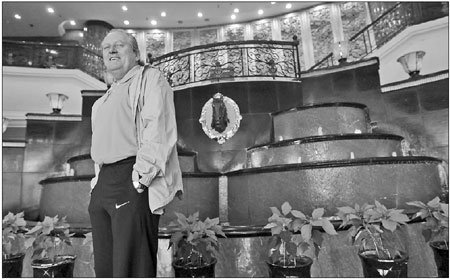Top News
Haan blasts local 'showmen'
By Tang Zhe (China Daily)
Updated: 2011-05-12 07:56
 |
Large Medium Small |
|
Dutch coach Arie Haan has led his team, Tianjin Teda, into the Asian Champions League second round. It is the only Chinese team to do so this season. [Photo by Cui Meng / China Daily] |

Veteran coach does not hold back in his assessment of Chinese soccer players and the game here in general, writes Tang Zhe after meeting the Dutchman in Tianjin.
Arie Haan was at the center of Chinese soccer when he was in charge of the country's national team from 2002 to 2004. Seven years later, the Dutchman is drawing attention again after leading domestic club Tianjin Teda to unprecedented success.
Under Haan's guidance Tianjin, the runner-up in last season's Chinese Super League, cruised into the second round of the 2011 AFC Champions League with one group game left to play by thumping Korean team Jeju United 3-0. Teda lost to Japan's Gamba Osaka 2-0 on Wednesday night.
However, despite his success in China, the 62-year-old still feels there is a lot of work to be done to improve the game here, not only because of the much-publicized corruption scandals, but also because of the attitude of domestic players on and off the pitch.
"Players are all showmen in China," said Haan, who had a coaching stint in Chongqing Lifan in 2009 before taking over Tianjin at the end of that year. "The players cheat all of the time," he said. "They get one little push and they fall down and the referee blows the whistle and then they stand up.
"In China I have seen people shouting at policemen, which is not done in Europe. And I have seen the same thing in soccer. When the referee does something the players turn around and shout and abuse him.
"The whole environment needs to change. The players have to change. They should accept a lot of things and not bicker with the referee. Play your game, focus on the game, that's very important and it makes it easier for the referee," he said.
Chinese soccer players were treated as national heroes after the country qualified for the 2002 World Cup in 2001. Though China failed to win a match or even score during that event, the year saw domestic stars Sun Jihai and Li Tie sign with English Premier League teams Manchester City and Everton respectively.
However, the image of Chinese soccer has been severely tarnished in recent years due to a series of match-fixing scandals.
Also, the new generation of Chinese players are finding it hard to adapt overseas, highlighted by Hao Junmin's struggles to make the grade at Schalke 04 in Germany.
"The players going to Europe have to change a little bit of their character," said Haan. "They have to believe they are really good, and still that's not enough they have to work, and they don't work enough.
"Chinese players are easily satisfied, but you can never be satisfied in soccer; you have to try and improve yourself in every match and at every training," said Haan, who scored six goals in his 35 national team games and is still hailed back in his home country for his 40-yard strike in Holland's match against Italy in the group stage of the 1978 World Cup.
Haan also believes China's lack of soccer stars and leaders has hindered the game's development.
Chinese soccer fans are more than willing to stay up late to watch a Spanish showdown between giants Real Madrid and Barcelona, but few go to domestic league games or even watch them on TV.
Also, according to Liu Peng, head of China's General Administration of Sports, there are only about 7,000 players under the age of 18 registered with the Chinese Football Association. Japan has 500,000.
"Everybody is doubting soccer in China," Haan said. "You don't have stars and you really need people to inspire the kids like Chinese basketball star Yao Ming.
"You don't have a player like him in soccer, and that's what you need to get more and more people interested in soccer," he said.
During Haan's two-year tenure in charge of the national team he led the squad to the Asian Cup final on home soil in 2004, where it was beaten by Japan 3-1.
That was China's last appearance in the final of the continent's most prestigious tournament and the struggling side has been eliminated twice at the group stage in following events. Head coach Gao Hongbo was widely criticized for discarding experienced players in a group game at this year's tournament in Doha.
Having been away from the national team for more than six years, Haan said it's hard for him to have any opinion about Gao's performance, but maintains the view that winning should be the priority of the national team and its coach.
"First of all, national teams should always go out to win ... and that means playing the best players," he said.
"When I was here, I had two or three months to work with the players and assess them. However, you have more and more games now and the time is not there any more to allow you to organize a national team over a period of, say, two months and bring your ideas to that group of players like you can do with a club.
"It's much more important now to choose the best players and see if they can play together."
| 分享按钮 |
